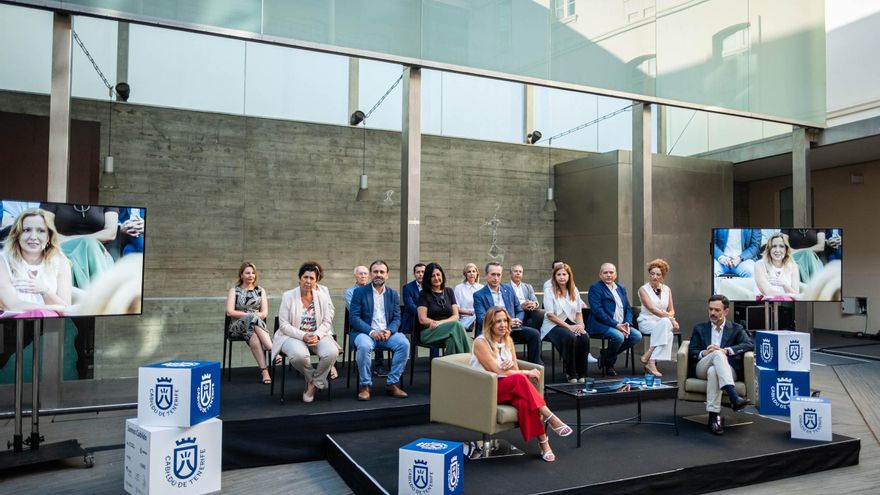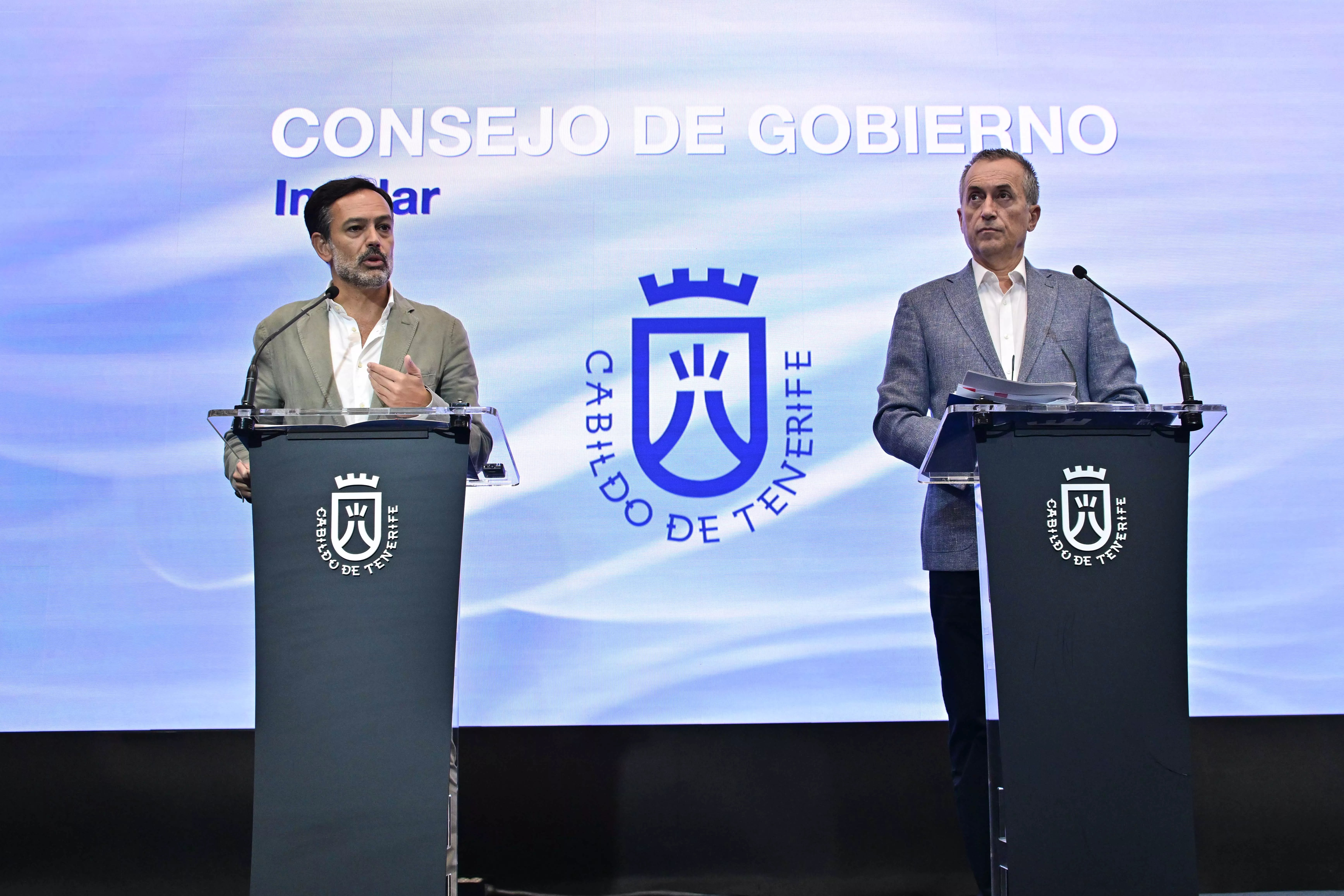
Year II of the government pact of CC and PP in the Cabildo of Tenerife. The nationalist Rosa Dávila, president, and the popular Lope Afonso, vice president, review the management at the midpoint of the mandate and outline the course for the upcoming challenges on the Island. They focus on four key areas in recounting their achievements: mobility; environment and sustainability; housing and social action; and economy and employment. This is based on two premises: the recovery of leadership in Canary Islands «after the four-year hibernation» of PSOE and Cs, and «the proven capacity for work». The president notes that they found a paralysed Island and an insular Corporation they describe as an aircraft carrier, likening it to «a Ferrari that was parked in the garage for four years during the previous term» and is now running.
This time they are not repeating the backdrop of the Hotel Escuela, where everything was designed, as they did in 2024; instead, they choose the Central Courtyard of the Nature and Archaeology Museum (MUNA) to host an event with a more institutional feel than last year. Both leaders, with their colleagues behind them (18 councillors, albeit missing José Carlos Acha, who was on a trip) – mixed together to graphically depict the idea of two parties, one team – reviewed what has been done, with «70% of the design already fulfilled or on track to be fulfilled», Dávila stated, and also previewed the strategic lines that will guide the second half of the mandate (2023-2027).
New scenario
One of the central axes of the review is mobility. Dávila emphasises the implementation of over 100 measures aimed at transforming the way Tenerife residents travel across the Island. «Achieving sustainable mobility has been a state matter for this government», she asserts. Among the most relevant milestones, the president highlights that in just two years, the number of public transport users has doubled, which has prevented over 40 million journeys in private vehicles.
This is complemented by the addition of 320 new eco-buses to modernise and decarbonise the Titsa fleet, as well as the staggering of university timetables across nine faculties and 13 degrees, in collaboration with the University of La Laguna (ULL). Furthermore, ten strategic connections within the road network have been improved – including segments of Polígono de Güímar, El Médano, Chafiras, Guajara, and Guargacho. Another advance is the expansion of the demand-responsive transport model, which is now operational in Arico, Fasnia, and Güímar.
Insular Plan
All of this is framed within a Sustainable Mobility Plan soon to be definitively approved. Dávila also announces the signing of a regional pact for sustainable mobility at the start of the next political course in September, which will involve social, economic, academic, and institutional stakeholders. In this regard, she refers to the role of the opposition, which «on many occasions» supports the government, against the «political noise» from outside. She believes it is important to manage dialogue spaces to reach significant agreements.
Challenge
For Dávila, reducing traffic is «an immeasurable challenge» that cannot be solved by building more roads but by fostering a cultural change, especially among the younger generation who are the most frequent users of free public transport. The president reminds us that Tenerife ranks among the ten highest motorisation rates globally, with 800,000 vehicles for a million inhabitants. «More cars than drivers», she emphasises.
High Occupancy
She also insists on the importance of prioritising buses and high-occupancy lanes, which will be installed between Santa Cruz de Tenerife and La Laguna, as well as between Güímar and the capital, to ease traffic and encourage carpooling and public transport use. All this is aimed with an eye on future north and south trains.
Environment: Active Land Management
In terms of sustainability, the president positively assesses the implementation of the eco-tax in the Masca area, «a positive trial for other areas such as the National Park of Teide, where full competencies will be transferred and a new Management Plan will play a fundamental role with the rehabilitated Altavista Refuge. The eco-tax in the Teno Rural Park canyon, «38 euros that tourists pay without issue», has helped reduce the mass influx of uncontrolled visitors. «It has eliminated the pressure of over 250 vehicles daily and has implemented a guided visit model that enriches the experience and protects the environment», she states.
New Vision
She advocates for a new vision of environmental management that integrates conservation, responsible tourism, and the welfare of the local population. Regarding the forest penny, a measure from the Government of the Canary Islands that will allow the cabildos to apply a surcharge of up to 0.02 euros per litre on fuel taxes, she noted that it will be allocated to reforesting the mountains. Dávila has urged citizens to view this fee as «a donation from all of us who use our vehicles to reforest the mountains of Tenerife».
Treatment Plants
The president has also emphasised the construction of treatment and desalination plants to prevent wastewater discharge into the sea, thus avoiding beach closures, to which the Cabildo allocates over 400 million. All necessary treatment plants for the island are underway, Dávila detailed, specifically referring to the plants in Médano, Puerto de la Cruz, Santa Cruz de Tenerife, and La Laguna. These treatment plants have been expedited due to the declaration of a water emergency, which has accelerated procedures by up to ten years.
Housing and Social Action: Responding to Demands
The insular vice president, Lope Afonso, highlights social action and access to housing as priorities of the current mandate. «We have been able to implement clear and effective policies that will make over 1,000 homes available to families by the end of the term», he indicates. In recent months, he elaborates that five public social rental promotions have been launched, amounting to 193 properties distributed across various municipalities on the island.
More Places
In the socio-healthcare field, Afonso informs of the creation of 518 new places within two years and an investment of over 140 million euros to enhance care for dependent individuals and the elderly. «We aim for a more humane and personalised model of care, in collaboration with the third sector», he points out in conclusion.
Economy and Employment: Boosting Productive Sectors
The vice president also emphasises the Cabildo’s commitment to economic dynamism as a key element for improving the quality of life of residents. «The best social policy is the creation of jobs», he states. Thanks to an active promotion policy, Tenerife is achieving record figures in employability and business confidence. Additionally, support for key sectors such as tourism, which remains the engine of the economy, industry, agriculture, and general primary sector, has been strengthened, with particular attention to generational change and to the equal opportunities for women. Afonso stresses the importance of a transversal approach to tourism management, aimed at improving coexistence and ensuring that benefits reach the entire population. «Tourism is a wealth generator that must be managed with order and respect», he concludes.
Youth Unemployment
Dávila values the positive trend in unemployment, especially the figures for youth unemployment. She insists that «Tenerife has once again become the economic engine of the Canary Islands» and criticises the previous insular government for halting all projects and leaving 233 million unspent compared to the 91% under her presidency, «with only 10% for personnel expenses» and barely 33 million allocated to debt.
Structural Decisions
Both leaders agreed that these two years have been marked by structural decisions designed to leave a lasting footprint in Tenerife. «It is not a time for statements of intent, but for planned action», Dávila emphasises. «We are in the midst of a great transformation», added Afonso, «and we are working with stability, transparency, and a forward-looking vision so that Tenerife leads the social and economic development of the Canary Islands».
















